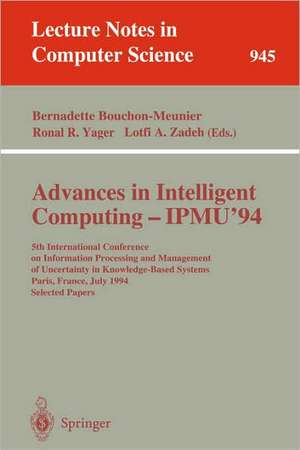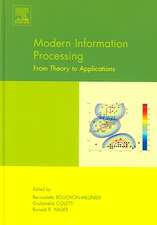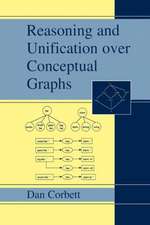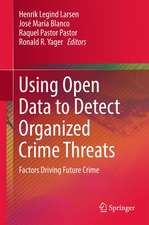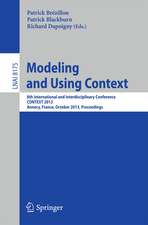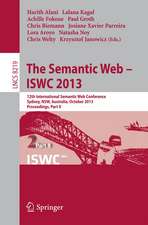Advances in Intelligent Computing - IPMU '94: 5th International Conference on Information Processing and Management of Uncertainty in Knowledge-Based Systems, Paris, France, July 4-8, 1994. Selected Papers: Lecture Notes in Computer Science, cartea 945
Editat de Bernadette Bouchon-Meunier, Ronald R. Yager, Lotfi A. Zadehen Limba Engleză Paperback – 26 iun 1995
In total, there are presented 63 thoroughly revised papers organized in sections on fundamental issues; theory of evidence; networks, probabilistic, statistical, and informational methods; possibility theory, logics, chaos, reusability, and applications.
Din seria Lecture Notes in Computer Science
- 20%
 Preț: 1061.55 lei
Preț: 1061.55 lei - 20%
 Preț: 307.71 lei
Preț: 307.71 lei - 20%
 Preț: 438.69 lei
Preț: 438.69 lei - 20%
 Preț: 645.28 lei
Preț: 645.28 lei -
 Preț: 410.88 lei
Preț: 410.88 lei - 15%
 Preț: 580.46 lei
Preț: 580.46 lei - 17%
 Preț: 427.22 lei
Preț: 427.22 lei - 20%
 Preț: 596.46 lei
Preț: 596.46 lei -
 Preț: 449.57 lei
Preț: 449.57 lei - 20%
 Preț: 353.50 lei
Preț: 353.50 lei - 20%
 Preț: 1414.79 lei
Preț: 1414.79 lei - 20%
 Preț: 309.90 lei
Preț: 309.90 lei - 20%
 Preț: 583.40 lei
Preț: 583.40 lei - 20%
 Preț: 1075.26 lei
Preț: 1075.26 lei - 20%
 Preț: 310.26 lei
Preț: 310.26 lei - 20%
 Preț: 655.02 lei
Preț: 655.02 lei - 20%
 Preț: 580.93 lei
Preț: 580.93 lei - 20%
 Preț: 340.32 lei
Preț: 340.32 lei - 18%
 Preț: 938.83 lei
Preț: 938.83 lei - 20%
 Preț: 591.51 lei
Preț: 591.51 lei - 15%
 Preț: 438.59 lei
Preț: 438.59 lei - 20%
 Preț: 337.00 lei
Preț: 337.00 lei -
 Preț: 389.48 lei
Preț: 389.48 lei - 20%
 Preț: 607.39 lei
Preț: 607.39 lei - 20%
 Preț: 1024.44 lei
Preț: 1024.44 lei - 20%
 Preț: 579.30 lei
Preț: 579.30 lei - 20%
 Preț: 763.23 lei
Preț: 763.23 lei - 20%
 Preț: 453.32 lei
Preț: 453.32 lei - 20%
 Preț: 575.48 lei
Preț: 575.48 lei - 20%
 Preț: 585.88 lei
Preț: 585.88 lei - 20%
 Preț: 825.93 lei
Preț: 825.93 lei - 20%
 Preț: 763.23 lei
Preț: 763.23 lei - 17%
 Preț: 360.19 lei
Preț: 360.19 lei - 20%
 Preț: 1183.14 lei
Preț: 1183.14 lei - 20%
 Preț: 340.32 lei
Preț: 340.32 lei - 20%
 Preț: 504.57 lei
Preț: 504.57 lei - 20%
 Preț: 369.12 lei
Preț: 369.12 lei - 20%
 Preț: 583.40 lei
Preț: 583.40 lei - 20%
 Preț: 343.62 lei
Preț: 343.62 lei - 20%
 Preț: 350.21 lei
Preț: 350.21 lei - 20%
 Preț: 764.89 lei
Preț: 764.89 lei - 20%
 Preț: 583.40 lei
Preț: 583.40 lei - 20%
 Preț: 649.49 lei
Preț: 649.49 lei - 20%
 Preț: 341.95 lei
Preț: 341.95 lei - 20%
 Preț: 238.01 lei
Preț: 238.01 lei - 20%
 Preț: 538.29 lei
Preț: 538.29 lei
Preț: 662.80 lei
Preț vechi: 828.50 lei
-20% Nou
Puncte Express: 994
Preț estimativ în valută:
126.82€ • 132.42$ • 104.96£
126.82€ • 132.42$ • 104.96£
Carte tipărită la comandă
Livrare economică 05-19 aprilie
Preluare comenzi: 021 569.72.76
Specificații
ISBN-13: 9783540601166
ISBN-10: 3540601163
Pagini: 648
Ilustrații: XII, 628 p.
Dimensiuni: 155 x 235 x 34 mm
Greutate: 0.89 kg
Ediția:1995
Editura: Springer Berlin, Heidelberg
Colecția Springer
Seria Lecture Notes in Computer Science
Locul publicării:Berlin, Heidelberg, Germany
ISBN-10: 3540601163
Pagini: 648
Ilustrații: XII, 628 p.
Dimensiuni: 155 x 235 x 34 mm
Greutate: 0.89 kg
Ediția:1995
Editura: Springer Berlin, Heidelberg
Colecția Springer
Seria Lecture Notes in Computer Science
Locul publicării:Berlin, Heidelberg, Germany
Public țintă
ResearchCuprins
Philosophical foundations for causal networks.- Non standard probabilistic and non probabilistic representations of uncertainty.- Argumentation systems and evidence theory.- Algebraic structures related to Dempster-Shafer theory.- Extension of lower probabilities and coherence of belief measures.- A note on multi-objective information measures.- Decision making using belief functions evaluation of information.- Hybrid propagation in junction trees.- Heuristic algorithms for the triangulation of graphs.- Computing marginals from the marginal representation in Markov trees.- Representation of Bayesian networks as relational databases.- Decision influence diagrams with fuzzy utilities.- Causal Networks and their toolkit in KSE.- Approximations of causal networks by polytrees: an empirical study.- Evidence propagation on influence diagrams and value of evidence.- Some varieties of qualitative probability.- The qualitative verification of quantitative uncertainty.- Uncertainty management using probability intervals.- Probabilistic consistency of conditional probability bounds.- Testing the convenience of a variate for stratification in estimating the Gini-Simpson diversity.- Fuzzy probabilities and their applications to statistical inference.- A bayesian functional approach to fuzzy system representation.- Information matrices associated to (h, ?)-divergence measures: Applications to testing hypotheses.- Informational energy test for equality of variances.- Compositive information measure of a fuzzy set.- Informational time.- Updating, transition constraints and possibilistic Markov chains.- Possibilistic logic as interpretability logic.- A numerical framework for possibilistic abduction.- Possibility theory and independence.- Handling hard rules and default rules inpossibilistic logic.- A general possibilistic framework for reliability theory.- Possibilistic semantic nets.- An essay on name and extension of rule-given properties.- On non-alethic logic.- Marginal problem in different calculi of AI.- Implication connectives for logics with right weakening.- Stochastic logic.- An approach to handle partially sound rules of inference.- Using classical theorem-proving techniques for approximate reasoning: Revised report.- Translation-based deduction methods for modal logics.- A system of knowledge representation based on formulae of predicate calculus whose variables are annotated by expressions of a “fuzzy” Terminological Logic.- Using preference based heuristics to control abductive reasoning.- Efficient interpretation of prepositional multiple-valued logic programs.- Many-valued epistemic states. An application to a reflective architecture: Milord-II.- Acoustical chaotic fractal images for medical imaging.- Chaos causes perspective reversals for ambiguious patterns.- Implications of a continuous approach to chaotic modeling.- “Homeostasic” control of imbalanced strangeattractors with or without asking to a change in chaotic dynamics.- A feature based reuse library.- Managing uncertainty in an object recovery process.- Juggling in free fall: Uncertainty management aspects of domain analysis methods.- Hybrid fuzzy metrics for software reusability.- A program transformation system for software reuse.- Abstract visualization of software.- Retrieval of images using Pixel based object models.- Object recognition based on pattern features.- Key-picture selection for the analysis of visual speech with fuzzy methods.- Effective scheduling of tasks under weak temporal interval constraints.- Introducing contextual information inmultisensor tracking algorithms.- FAM on grain scheduling control of highly nonlinear and disturbed processes.- How to choose according to partial evaluations?.- The role of measurement uncertainty in numeric law induction.
